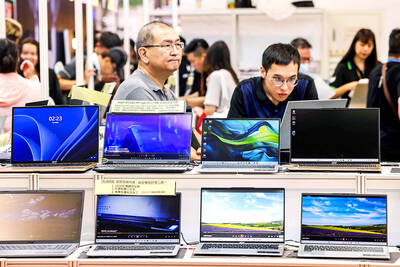The European Central Bank (ECB) yesterday agreed to embark on a quantitative-easing (QE) program, which together with its existing schemes, will pump 60 billion euros (US$69.7 billion) into the eurozone economy from March until the end of September next year.
Countries under a bailout program, such as Greece, will be included, but with some additional criteria.
Meanwhile, the ECB held its key interest rates unchanged yesterday at its first policy meeting this year.
As widely expected, the ECB said in a statement that it was holding its main “refinancing” rate steady at 0.05 percent, and its two other rates — the marginal lending and the deposit rates — at 0.3 percent and minus-0.2 percent respectively.
The ECB is launching the QE program with a view to buoying the flagging eurozone economy, where inflation has turned negative and — at minus-0.2 percent — is far below the central bank’s target of just under 2 percent.
“Under this expanded program the combined monthly purchases of public and private sector securities will amount to 60 billion euros,” ECB President Mario Draghi said at a news conference.
“They are intended to be carried out until end-September 2016 and will in any case be conducted until we see a sustained adjustment in the path of inflation,” he said.
The euro weakened against the US dollar as Draghi announced the expanded asset-purchase program.
The euro fell 0.5 percent to US$1.1555 at 1:43pm in London, after sliding as much as 0.8 percent to US$1.1513. It slid to US$1.1460 on Friday last week, the weakest level since November 2003.
The shared currency fell 0.4 percent to ¥136.41. The US dollar was little changed at ¥117.92.
Meanwhile, stocks rose with US equity-index futures, while US Treasuries fell with German bunds.
The STOXX Europe 600 Index gained 1 percent at 8:40am in New York. Standard & Poor’s 500 Index future gained 0.5 percent.
The yield on 10-year Treasuries increased 6 basis points to 1.94 percent. Gilts fell and Japanese 10-year yields jumped the most since 2013.
Oil climbed 0.6 percent to US$48.09 a barrel.
Additional reporting by Bloomberg

TECH TITAN: Pandemic-era demand for semiconductors turbocharged the nation’s GDP per capita to surpass South Korea’s, but it still remains half that of Singapore Taiwan is set to surpass South Korea this year in terms of wealth for the first time in more than two decades, marking a shift in Asia’s economic ranks made possible by the ascent of Taiwan Semiconductor Manufacturing Co (TSMC, 台積電). According to the latest forecasts released on Thursday by the central bank, Taiwan’s GDP is expected to expand 4.55 percent this year, a further upward revision from the 4.45 percent estimate made by the statistics bureau last month. The growth trajectory puts Taiwan on track to exceed South Korea’s GDP per capita — a key measure of living standards — a

READY TO HELP: Should TSMC require assistance, the government would fully cooperate in helping to speed up the establishment of the Chiayi plant, an official said Taiwan Semiconductor Manufacturing Co (TSMC, 台積電) yesterday said its investment plans in Taiwan are “unchanged” amid speculation that the chipmaker might have suspended construction work on its second chip packaging plant in Chiayi County and plans to move equipment arranged for the plant to the US. The Chinese-language Economic Daily News reported earlier yesterday that TSMC had halted the construction of the chip packaging plant, which was scheduled to be completed next year and begin mass production in 2028. TSMC did not directly address whether construction of the plant had halted, but said its investment plans in Taiwan remain “unchanged.” The chipmaker started

MORTGAGE WORRIES: About 34% of respondents to a survey said they would approach multiple lenders to pay for a home, while 29.2% said they would ask family for help New housing projects in Taiwan’s six special municipalities, as well as Hsinchu city and county, are projected to total NT$710.65 billion (US$23.61 billion) in the upcoming fall sales season, a record 30 percent decrease from a year earlier, as tighter mortgage rules prompt developers to pull back, property listing platform 591.com (591新建案) said yesterday. The number of projects has also fallen to 312, a more than 20 percent decrease year-on-year, underscoring weakening sentiment and momentum amid lingering policy and financing headwinds. New Taipei City and Taoyuan bucked the downturn in project value, while Taipei, Hsinchu city and county, Taichung, Tainan and Kaohsiung

Micro-Star International Co (MSI, 微星科技) is expanding notebook computer production in India after partnering with Indian electronics maker Syrma SGS Technology Ltd late last year, as the Taiwanese company seeks to tap into the local market. MSI also plans to manufacture some of its new gaming PCs powered by Nvidia Corp’s RTX 50 graphics cards in India, while adding more advanced and design-focused PCs and notebooks at Syrma’s plant in Chennai, a source told the Taipei Times yesterday on condition of anonymity. MSI’s deployment in India is driven not only by cost advantages, but also by India’s rapidly expanding consumer market and